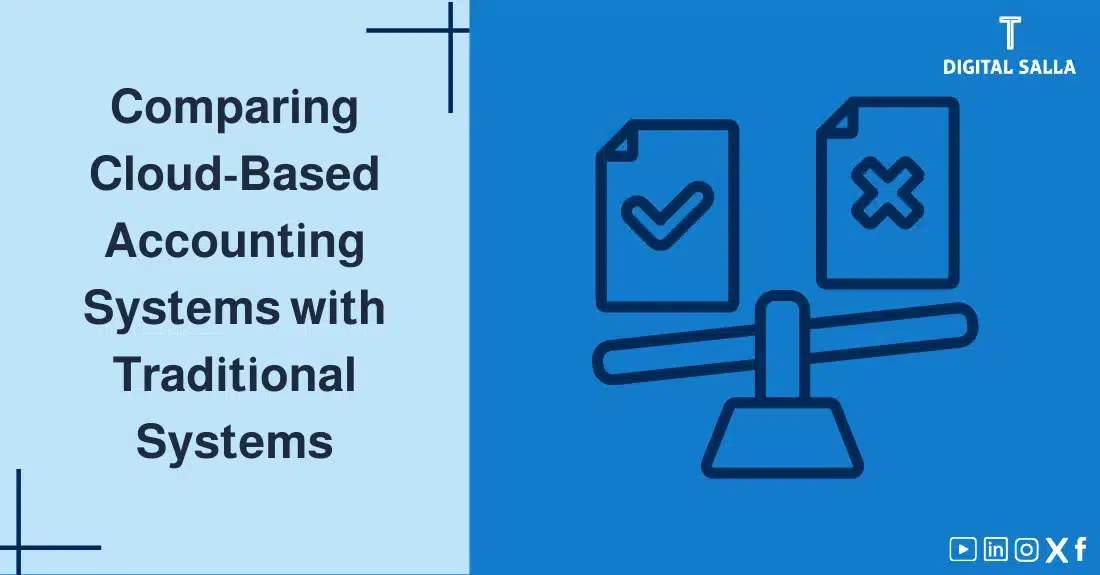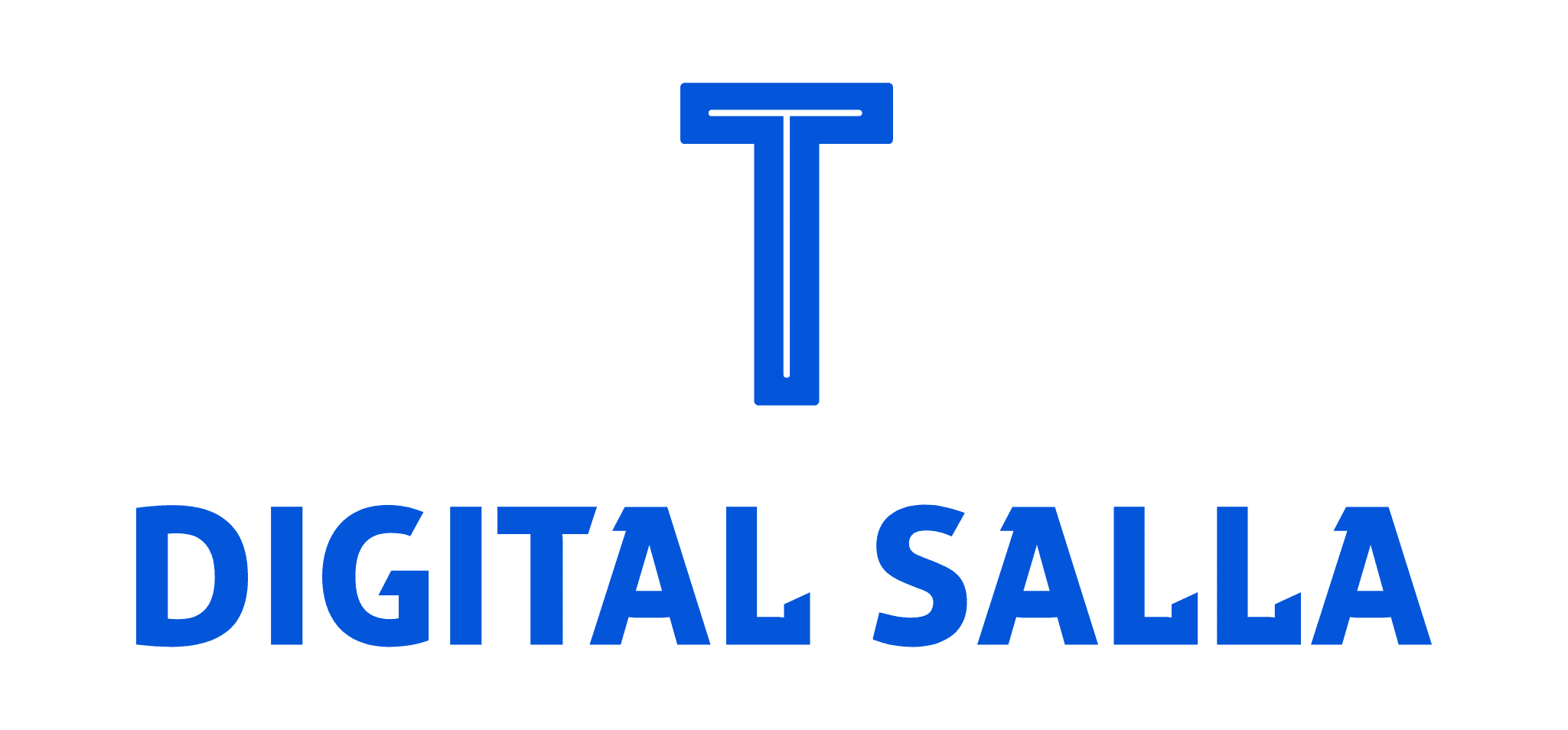Comparison of Accounting Systems, contrasting cloud-based and traditional options.

Cloud accounting systems have emerged as a strong alternative to traditional (on-premise) accounting systems. Each of these two types of systems has its advantages and disadvantages, and the choice between them depends on the company’s needs, size, and budget. This is where a Comparison of Accounting Systems becomes crucial. In this article, we will conduct a Comparison of Accounting Systems, focusing on cloud-based and traditional systems, and discuss the key differences between them. We will focus on cost, accessibility, security, maintenance, updates, and technical support to help you make the most suitable decision for your company.
What are Traditional (On-Premise) Accounting Systems?
Traditional accounting systems, also known as desktop systems, are accounting software programs that are installed and run on the company’s own computers and servers. These systems require purchasing software licenses and installing them on each device, and require continuous management and maintenance by the company’s IT team.
What are Cloud-Based Accounting Systems?
Cloud-based accounting systems are accounting software programs that are accessed via the internet through a web browser or smartphone application. Financial data is stored on the servers of the service provider, and there is no need to install any software on local computers. Cloud-based accounting systems typically rely on a monthly or annual subscription model.
Comparison of Accounting Systems: Cloud vs Traditional:
| Feature | Traditional Accounting Systems | Cloud-Based Accounting Systems |
|---|---|---|
| Initial Cost | High (software licenses, servers, infrastructure) | Low (no significant upfront costs) |
| Maintenance Costs | High (hardware maintenance, software updates, IT team salaries) | Low (the service provider handles maintenance and updates) |
| Accessibility | Limited to access to devices with the software installed | Access from anywhere, anytime via the internet |
| Scalability | Difficult and expensive | Easy and scalable according to company needs |
| Security | Depends on the company’s security measures | Depends on the service provider’s security measures, which are usually high |
| Updates | Requires purchasing and manually installing new updates | Automatic updates by the service provider |
| Backup | Company responsibility | Automatic backup by the service provider |
| Technical Support | May be limited or expensive | Usually available as part of the subscription |
| Integration | Can be difficult and expensive | Easier and smoother integration |
| Setup and Installation | Requires Time and Effort | Quick and Easy |
| Flexibility | Less Flexible | More Flexible and adaptable to change |
Advantages of Traditional Accounting Systems:
- Full Control: Traditional accounting systems give the company complete control over its financial data and IT infrastructure.
- Security: Traditional accounting systems may provide a greater sense of security for some companies, as the data does not leave the company’s premises.
- Customization: Traditional accounting systems can be customized more to meet the company’s specific needs.
- No Internet Dependence: Traditional accounting systems do not require a permanent internet connection to operate.
Disadvantages of Traditional Accounting Systems:
- High Initial Cost: Traditional accounting systems require significant investments in purchasing software licenses, servers, and IT infrastructure.
- High Maintenance Costs: The company bears the costs of hardware maintenance, software updates, and IT team salaries.
- Difficulty of Remote Access: It is difficult to access financial data remotely using traditional accounting systems.
- Not Easily Scalable: It can be difficult and expensive to scale traditional accounting systems as the company grows.
- Risk of Data Loss: Financial data stored locally is at risk of loss or damage in the event of a hardware failure or natural disaster.
Advantages of Cloud-Based Accounting Systems:
- Low Cost: Cloud-based accounting systems do not require significant investments in IT infrastructure, as they rely on a monthly or annual subscription model.
- Ease of Access: Financial data can be accessed from anywhere, anytime via the internet, using any device connected to the internet.
- Scalability: Cloud-based accounting systems can be easily scaled to meet the needs of growing companies.
- Automatic Updates: The service provider is responsible for updating the software and fixing bugs, saving the company time and effort.
- Automatic Backup: Financial data is automatically backed up by the service provider, reducing the risk of data loss.
- Security: Cloud-based accounting systems usually provide a high level of security, as data is encrypted and advanced security measures are used to protect it.
- Easy Integration with Other Systems: Cloud-based accounting systems easily integrate with many other applications, such as Customer Relationship Management (CRM) systems and e-commerce platforms.
Disadvantages of Cloud-Based Accounting Systems:
A Comparison of Accounting Systems includes several factors, including internet dependence, as cloud accounting systems require a permanent internet connection to operate, which may be an obstacle in areas with poor connectivity. Security concerns are also a point to consider when doing a Comparison of Accounting Systems, as some companies may be concerned about storing their financial data on external servers, although most cloud services offer advanced security measures to protect data.
As for reliance on the service provider, it is an important factor, as the company depends entirely on the provider to operate and maintain the system, which may lead to problems in the event of service interruption or the provider’s bankruptcy.
Finally, limited customization is a point that distinguishes traditional systems from cloud-based ones, as customization options in cloud systems may be limited compared to traditional systems, which is something to take into account when performing a Comparison of Accounting Systems to choose the optimal solution according to the company’s needs.
How to Choose the Right Accounting System:
The choice of the appropriate accounting system (traditional or cloud-based) depends on the company’s needs and specific circumstances. The following factors should be considered when making the decision:
1. Company Size and Operational Complexity
A Comparison of Accounting Systems depends on the size of the company and the complexity of its operations. Traditional accounting systems may be suitable for companies with complex operations requiring a high degree of customization and control, while cloud-based accounting systems are ideal for small and medium-sized businesses seeking easy-to-use and cost-effective solutions.
2. Budget and Costs
In terms of budget, cloud-based accounting systems have lower initial and maintenance costs, whereas traditional accounting systems require significant upfront investments and higher maintenance costs.
3. IT Infrastructure
If a company has a strong IT infrastructure and a dedicated team, traditional accounting systems may be a viable option. However, for companies lacking these resources, cloud-based accounting systems are often the better choice.
4. Remote Access Needs
For employees who need access to financial data from anywhere, cloud-based accounting systems provide the best solution. However, security concerns should be carefully evaluated when conducting a Comparison of Accounting Systems to ensure financial data protection.
5. System Integration
Regardless of whether an accounting system is traditional or cloud-based, it must integrate seamlessly with other business systems, such as inventory management and point-of-sale systems. This highlights a critical consideration when making a Comparison of Accounting Systems.
Role of Technology in the Development of Accounting Systems:
Technology has revolutionized the field of accounting and led to the significant development of accounting software. Companies can now benefit from advanced accounting software that offers many advantages, such as:
- Automating Accounting Processes: Software reduces human errors and saves time and effort.
- Improving the Accuracy of Financial Data: Software ensures the accuracy of financial data by applying unified accounting rules.
- Generating Financial Reports Easily: Software facilitates the preparation of financial statements and other financial reports.
- Enhancing Financial Control: Software provides tools for internal control over financial operations.
- Making Better Decisions: Software provides accurate and up-to-date financial information that helps management make informed decisions. This improved decision making is a key benefit highlighted in any Comparison of Accounting Systems.
Future of Accounting Systems:
Accounting systems are expected to continue to evolve in the coming years, driven by rapid technological advancements. Key future trends in this area include:
- Artificial Intelligence (AI): AI technologies will be increasingly integrated into accounting systems to automate complex tasks, improve the accuracy of financial forecasts, and provide more intelligent analytics.
- Blockchain Technology: Blockchain technology may lead to a radical change in how financial transactions are recorded and audited, which may lead to the emergence of a new generation of accounting systems that are more secure and transparent.
- Cloud Computing: Reliance on cloud computing in accounting systems will continue, providing numerous advantages such as ease of access, lower cost, and automatic updates. Cloud computing has dramatically altered the parameters of a Comparison of Accounting Systems.
Conclusion :
Regulatory changes significantly impact how companies prepare financial statements, requiring continuous adaptation. Understanding and managing the Impact of Regulatory Changes on Financial Statements is no longer optional—it’s essential for compliance, accurate reporting, and maintaining stakeholder trust. Companies must proactively assess, plan for, and implement changes to their accounting systems and processes in response to evolving regulations To learn more about prominent accounting software and their features, you can read our article on: [Comparison of Prominent Accounting Software in Terms of Features and Cost].
